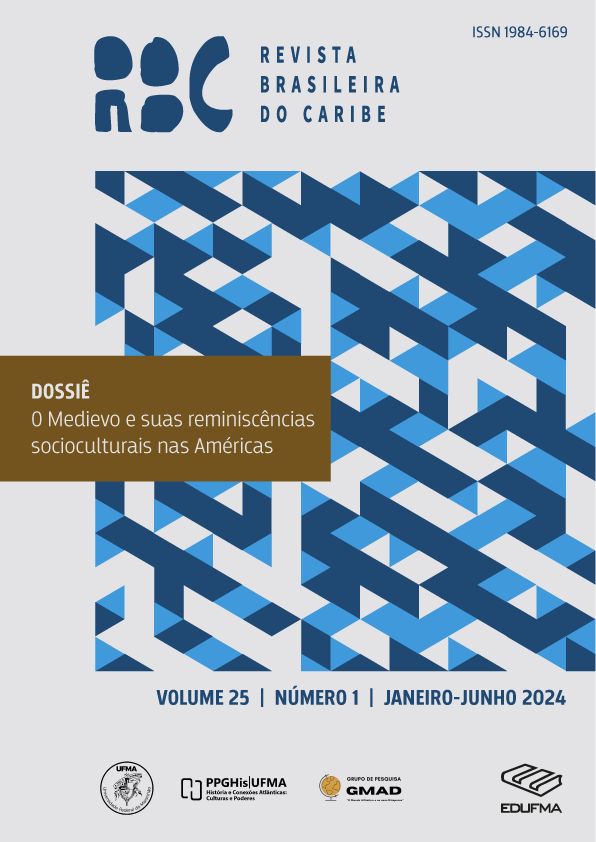The Carolingian Cycle and its route through the Iberian Peninsula
Keywords:
Cavalry, Islam, RoncevauxAbstract
The Carolingian Cycle constitutes a compendium of medieval poems of diverse authorship, created in different periods, which have as their central theme the Frankish emperor Charlemagne and his family relationships, covering predecessors, uncles, nephews, among others. These narratives exerted a marked influence on French medieval culture, being conceived from the 11th century onwards. They achieved significant success in reaching the original target audience, the nobility, but, in addition, they enjoyed popularity among different social layers, surpassing geographical borders and extending to other countries on the European continent, notably Spain and Portugal.
Downloads
References
KROEBER, A. et SERVOIS, G. Fierabras. Chanson de geste. Publiée pour la première fois d’après les manuscrits de Paris, de Rome et de Londres. Paris, 1860.
BÉDIER, Joseph. La Chanson de Roland (Manuscrit d’Oxford). Paris: L’edicion D’arts, 1923.
SUBRENAT, Jean. La Chanson de Roland-Le Manuscrit de Châteauroux. Honorè Champion Éditeur, Paris, 2016.
BIBLIOGRAFIA
BAILEY, Matthew and GILES,Ryan D. eds., Charlemagne and his Legend in Early Spanish Literature and Historiography, Bristol Studies in Medieval Cultures. Cambridge: D. S. Brewer, 2016.
BAYARD, Jean Pierre. História das Lendas. Trad. Jeanne Marillier. São Paulo: Difusão Europeia do Livro,1957.
BÉDIER. Joseph. La Chanson de Roland (Manuscrit d’Oxford). Paris: L’edicion D’arts, 1923.
CARVALHO, J. Moreira de. História do Imperador Carlos Magno, e dos Doze Pares de França. Tradução do castelhano ao português. Lisboa: Tipographia Rollandiana, 1863.
CASCUDO, Luis da Câmara. Literatura Oral no Brasil. 3ª ed. Belo Horizonte: Itatiaia; São Paulo: Editora da Universidade de São Paulo, 1984.
CASCUDO, Luis da Câmara. Mouros, franceses e judeus: três presenças no Brasil. 3. Ed. São Paulo: Global, 2001.
CATALÁN, Diego. La épica española: nueva documentación y nueva evaluación, Madrid: Fundación Ramón Menéndez Pidal, 2001. La Épica Española.
DA LITTERATURA DOS LIVROS DE CAVALLARIAS. Vienna : Na imprensa do Filho de Carlos Gerold, 1872.
DOLAN GOMÉS, Miguel. Rex Parvus and Rex Nobilis? Charlemagne and the Politics of History (and Crusading) in Thirteenth-Century Iberia. In The Legend in Medieval Latin Texts, edited by Wilain J. Purkis and Matthew Gabriele, .Cambridge: D. S. Brewer, 2016 (92-114).
FERNANDES, Ceres Costa. Apontamentos de literatura medieval: literatura e religião. São Luís: Ed. AML, 2000.
GAUTIER, Leon. La Chanson de Roland - Texte critique et commentaire. Tours, Alfred Mame et Fils, 1875.
GILES, Ryan D. Converting the Saracen: The Historia del emperador Carlomagno and the Christianization of Granada. In: BAILEY, Matthew; GILES, Ryan D. (eds). Charlemagne and his legend in Early Spanish literature and historiography. Cambridge: D. S. Brewer. 2016, p. 123-148.
IRUJO, Xabier. Charlemagne’s Defeat in the Pyrenees: The Battle of Rencesvals, Amsterdam: Amsterdam University Press, 2021.
LOT, Ferdinand. Quelques mot sur l’origine des Pairs de France. In: Revue historique, Tome LIV. Paris: Presses Universitaires de France, 1893.
MACEDO, José Rivair. Mouros e cristãos: a ritualização da conquista no velho e no Novo Mundo, Bulletin du centre d’études médiévales d’Auxerre | BUCEMA [En ligne], Hors-série n° 2 | 2008, mis en ligne le 25 janvier 2009.
MANDACH, André. Naissance et développement de la chanson de geste en Europe, Volume 5. Genève: Librairie Droz, 1987.
MENENDEZ PIDAL, Ramón. La epopeya castellana a través de la literatura española. (1945). Madrid: Espasa-Calpe, 1974.
MORRISSEY, Robert. Charlemagne and France: A Thousand Years of Mythology. Translated by, Catherine Tihanyi. The Laura Shannon Series in French Medieval Studies. Notre Dame, IN: University of Notre Dame Press, 2003.
NISO, Rebeca Lázaro. La Leyenda de Bernardo del Carpio y su proyección en la Literatura. In: Cuadernos de Aleph, 7, 2015, (pp.79-95).
PARIS, Gaston. Historie Poétique de Charle Magne. Tese de doutorado apresentada na Universidade de Sorbonne em dezembro de 1865.
RODRÍGUEZ CASILLAS, Carlos J.: “Geraldo ‘Sempavor’: las hazañas de un guerrero portugués por tierras extremeñas”, en Coloquios Históricos de Extremadura. Trujillo, 2009. (693-715).
RUCQUOI, Adeline. La France dans l’historiographie médiévale castillane. In: Annales. Économies, sociétés, civilisations. 44e année, N. 3, 1989. (pp. 677-68), p. 677-679.
SANTOS COCO, Francisco. Historia Silense Edición preparada por F. Santos Coco. Junta para ampliación de estudios e investigaciones históricas. Centro de Estudios históricos, Madrid, 1921.
SUBRENAT, Jean. La Chanson de Roland-Le Manuscrit de Châteauroux. Honorè Champion Éditeur, Paris, 2016.
Downloads
Published
How to Cite
Issue
Section
License

This work is licensed under a Creative Commons Attribution-NonCommercial-NoDerivatives 4.0 International License.
Direitos autorais Revista Brasileira do Caribe
Este obra está licenciado com uma Licença Creative Commons Atribuição-NãoComercial-SemDerivações 4.0 Internacional.




